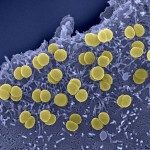Lien vers Pubmed [PMID] – 32295520
Lien DOI – 10.1186/s12866-020-01760-4
BMC Microbiol 2020 Apr; 20(1): 92
Neisseria meningitidis serogroups W and Y are the most common serogroups causing invasive meningococcal disease in Sweden. The majority of cases are caused by the serogroup W UK 2013 strain of clonal complex (cc) 11, and subtype 1 of the serogroup Y, YI strain of cc23. In this study, virulence factors of several lineages within cc11 and cc23 were investigated in transgenic BALB/c mice expressing human transferrin. Transgenic mice were infected intraperitoneally with serogroup W and Y isolates. Levels of bacteria and the proinflammatory cytokine CXCL1 were determined in blood collected 3 h and 24 h post-infection. Apoptosis was investigated in immune cells from peritoneal washes of infected mice. Adhesion and induction of apoptosis in human epithelial cells were also scored.The levels of bacteraemia, CXCL1, and apoptosis were higher in serogroup W infected mice than in serogroup Y infected mice. Serogroup W isolates also induced higher levels of apoptosis and adhesion in human epithelial cells. No significant differences were observed between different lineages within cc11 and cc23.N. meningitidis Serogroup W displayed a higher virulence in vivo in transgenic mice, compared to serogroup Y. This was reflected by higher bacteremia, proinflammatory activity, and ability to induce apoptosis in mouse immune cells and human epithelial cells.

